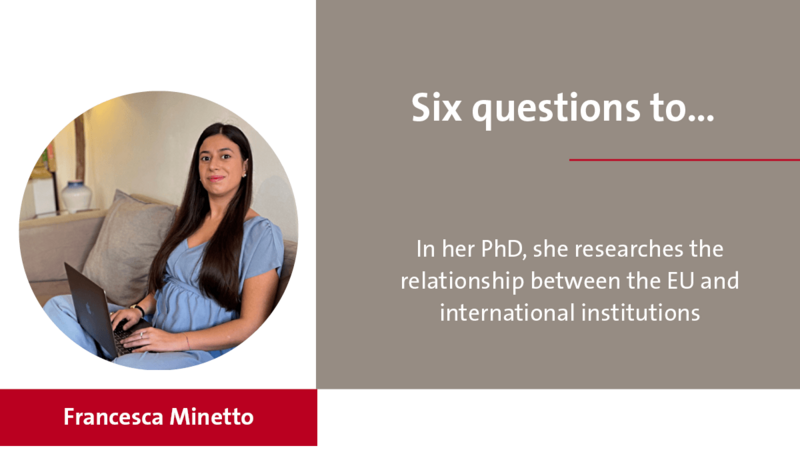
Growing up on the border between Italy and Slovenia, Francesca Minetto felt first hand the effects of EU membership when Slovenia joined in 2004. She now spends her time researching the impact of international institutions on EU policies and cycling in the forest outside of Berlin.
In our series "Six questions to...", we introduce the PhD students at the Jacques Delors Centre and their research projects and thoughts on the European Union. Francesca Minetto is a PhD candidate at the Jacques Delors Centre, studying international institutions and the EU.
1. What is the main focus of your research/your PhD project in one sentence?
I believe that asking a PhD student to summarise their research in a sentence is similar to asking a circle to show us its angles, but I will give it a try: My PhD focuses on international institutions’ impact on the European Union and its policies.
2. How did you end up working on the EU?
As a citizen between borders, I appreciated from a young age the importance of the European Union. I grew up in the Easternmost region of Italy, where I attended a Slovenian school. I still remember vividly how something changed after Slovenia officially joined the EU and a border rich of histories of fresh conflict came down. The meaning of free movement of persons became tangible for all of us. Since then, my interest in studying the European Union developed through life encounters with some incredible courses in my undergraduate studies in European Law and with the salience of the European Union in public debates in Italy throughout the Eurozone crisis. More generally, my interest persists with the realisation that I’ll never be able to understand it fully, which is a compelling reason to keep working on it!
3. In your opinion, what is the most important issue the EU needs to solve?
Currently, but in all honesty, always, there have been several significant issues on the EU’s table. At present, one can think of democratic backsliding, the tragic paradox of the EU’s asylum policy and its border management, democratic deficit, fiscal policy as the most important issues the EU needs to solve. I would like to add that the EU still doesn’t manage to make itself understandable and accessible to its citizens, and this is an issue that the EU needs to solve to ensure its survival in the long run.
4. What is your favourite place in Berlin to relax after an intense work day?
In the past few... years, most of my workdays, like those of so many others, have been confined to the four walls of my Berlin apartment. So, lately, when I could, my favourite place to relax was on a bike, going for a short ride in the Grunewald, a forest in the west of Berlin.
5. What is the research question you would really like to answer one day?
I see that I might have this in common with some of my fellow PhD students, but, for now, one day, I really hope to comprehensively answer the research question that led me to pursue a PhD.
6. How would you explain the EU to an alien?
I would like to start by telling you we can’t all agree on what the European Union is: an international organisation, a political system, a multi-level polity, a complex institutional configuration unparalleled to any other? We could probably all agree that it is a Union of states, which after fighting each other for centuries, decided to halt it all in the name of coal and steel. Since then, the EU integrated and grew in various areas relevant to humans, generally bringing prosperity to the 28 states that joined it(by the way, one left). But let me tell you, it can at times be a dysfunctional system that has difficulties acting in certain areas, and with a few fundamental issues, it doesn’t seem to manage to solve. However, aren’t we all a bit dysfunctional at times?
